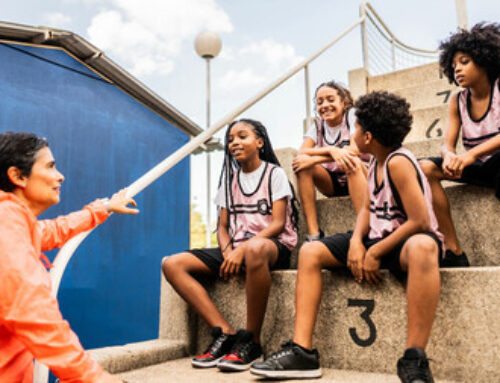The Impact of Social Media on Youth Athletes
Social Media a Blessing and a Curse
Social media has injected itself into every aspect of our lives. It can tell us current news, sports updates, what is happening with the most celebrities, and even advise on how to live our lives. It provides us with answers to our problems as quickly as our thumbs can scroll and our eyes can scan. Is having an endless supply of information (both real and false) always at our fingertips a good thing?
Most young people in today’s society (and many adults for that matter) could not go a day without using some social media platform. There are many positives to the rise of social media. Still, given that social media is so far-reaching into our everyday lives, there are negative impacts and those looking to take advantage of us to make a quick buck. How is this constant exposure to social media affecting us? This article will touch on social media’s pro and con side from real athletes’ perspective in their teens and early twenties to see if social media has made life easier or put more pressure on young athletes.
Positive Impacts Of Social Media
Despite what many believe, there are positives to the rise of social media. It provides a wealth of information for athletes looking to improve themselves physically and mentally, usually free of charge. In real-time, they can see what the elite in their sport is doing, which can be transformed into motivation for younger athletes wanting to achieve that level of greatness. From a 20-year-old women’s collegiate soccer player currently training with us at KSP – “seeing athletes performing in their sports on social media inspires me to continue performing and growing in my sport.”
Social media also provides a distraction from the real world and sport, which for many youth athletes (and their parents) is often crammed so full of events that there is barely time to sleep and eat. Many of the athletes questioned for this paper reported they used social media to unwind at the end of the day or during downtime between events. They cited posts that make them laugh as the number one unrelated to sports content they consistently follow.
Finally, there is the obvious social interaction that social media provides to users. They can instantly interact with their peers from around the globe with a couple of stamps of their thumbs. Communication through devices and apps makes interacting with those close to us emotionally much easier than in the past. Now users can comment on a post or send and text instantly without verbally communicating at all. The search for likes and positive comments can have positive reinforcement, but there are cons to continually seeking approval.
Negative Impacts Of Social Media
Unfortunately, all of the positives just mentioned above can also be negatives depending on the point of view. For instance, although social media contains a wealth of knowledge on many subjects, this knowledge may be misleading or altogether wrong. Many athletes questioned cited that although social media can be a distraction right away from everyday life and provide comedic relief to an overly stressed lifestyle, it can be the wrong way. It could eat into time that they could be spending on bettering themselves through sport skill or education. It also has the power over these young athletes to completely deter them from getting their homework done and having any hobbies in general. We looked at a few athlete’s screen time with their permission. Many averaged between 6-8 hours per day on their phones, with most of this time spent on social media, particularly tik-tok. When asked what they do for fun, the typical response was, “I get on my phone.”
One of the most substantial negative impacts of social media is the unrealistic images in front of young athletes’ eyes. They are constantly bombarded with edited images of models and athletes that give them unrealistic expectations of body image what life is actually like. Many influencers on social media give viewers the idea that their lives are perfect, making the young viewers believe that their lives should be perfect. This highlights the imperfections in their lives and physical looks that can lead to depression or decreased self-confidence, which in my opinion is one of the most dangerous factors in terms of an athlete’s career.
If social media can have these severe negative effects on an athlete’s life, why not quit it? Several athletes were asked this question. Interestingly, the common rebuttal was that they felt as though they couldn’t quit it. When further scrutinized on the topic, athletes came back with feelings left out socially if they were to stop. So much of life is now lived through social media that young athletes feel they lose connection with friends without it. One athlete stated, “if I were to rid myself of social media, I would ultimately be suffering for several reasons, becoming disconnected being the greatest one.” By disconnected, she meant from friends and her sport (soccer) in general.
Social media has crept into every aspect of our lives regardless of age or willingness to succumb to it. Given this, most cannot go a day without taking a hit from some source of social media. Young athletes may be one of the biggest demographics impacted by social media as they are the first generation to grow up with it present in everyday life. Because of this, many of their lives are controlled by the happenings on social media. This may sound like social media is evil and that it is all bad. However, there are positives to the rise of social media. For one, it provides athletes with a wealth of knowledge at their fingertips. It can provide a distraction from a stressful world with an overflow of schoolwork and sporting events. Thirdly, it provides instant social interaction between peers from across the room or the world.
Depending on the point of view, those can all be negative effects as well. Social media can provide athletes with false information, distract them from things they need to get done and act as a substitute for having real hobbies. Most importantly, it can give young, easily influenced athletes a false perspective of what life is like and highlight imperfections in themselves and their lives, which can have detrimental effects on both the person and their athletic achievement. In some ways, social media is like a drug in that many feel that once started, they cannot quit.
Social media can be a useful tool for development and distraction, but it can be a weapon of mental and athletic destruction in similar ways. The line between is often blurred.
Read More
- 3 All-Too-Common Mistakes Trainers Make on Social Media
- A High School Athlete’s Guide to Using Social Media Effectively
- Social Media Guidelines for Aspiring Strength Coaches
RECOMMENDED FOR YOU
The Impact of Social Media on Youth Athletes
Social Media a Blessing and a Curse
Social media has injected itself into every aspect of our lives. It can tell us current news, sports updates, what is happening with the most celebrities, and even advise on how to live our lives. It provides us with answers to our problems as quickly as our thumbs can scroll and our eyes can scan. Is having an endless supply of information (both real and false) always at our fingertips a good thing?
Most young people in today’s society (and many adults for that matter) could not go a day without using some social media platform. There are many positives to the rise of social media. Still, given that social media is so far-reaching into our everyday lives, there are negative impacts and those looking to take advantage of us to make a quick buck. How is this constant exposure to social media affecting us? This article will touch on social media’s pro and con side from real athletes’ perspective in their teens and early twenties to see if social media has made life easier or put more pressure on young athletes.
Positive Impacts Of Social Media
Despite what many believe, there are positives to the rise of social media. It provides a wealth of information for athletes looking to improve themselves physically and mentally, usually free of charge. In real-time, they can see what the elite in their sport is doing, which can be transformed into motivation for younger athletes wanting to achieve that level of greatness. From a 20-year-old women’s collegiate soccer player currently training with us at KSP – “seeing athletes performing in their sports on social media inspires me to continue performing and growing in my sport.”
Social media also provides a distraction from the real world and sport, which for many youth athletes (and their parents) is often crammed so full of events that there is barely time to sleep and eat. Many of the athletes questioned for this paper reported they used social media to unwind at the end of the day or during downtime between events. They cited posts that make them laugh as the number one unrelated to sports content they consistently follow.
Finally, there is the obvious social interaction that social media provides to users. They can instantly interact with their peers from around the globe with a couple of stamps of their thumbs. Communication through devices and apps makes interacting with those close to us emotionally much easier than in the past. Now users can comment on a post or send and text instantly without verbally communicating at all. The search for likes and positive comments can have positive reinforcement, but there are cons to continually seeking approval.
Negative Impacts Of Social Media
Unfortunately, all of the positives just mentioned above can also be negatives depending on the point of view. For instance, although social media contains a wealth of knowledge on many subjects, this knowledge may be misleading or altogether wrong. Many athletes questioned cited that although social media can be a distraction right away from everyday life and provide comedic relief to an overly stressed lifestyle, it can be the wrong way. It could eat into time that they could be spending on bettering themselves through sport skill or education. It also has the power over these young athletes to completely deter them from getting their homework done and having any hobbies in general. We looked at a few athlete’s screen time with their permission. Many averaged between 6-8 hours per day on their phones, with most of this time spent on social media, particularly tik-tok. When asked what they do for fun, the typical response was, “I get on my phone.”
One of the most substantial negative impacts of social media is the unrealistic images in front of young athletes’ eyes. They are constantly bombarded with edited images of models and athletes that give them unrealistic expectations of body image what life is actually like. Many influencers on social media give viewers the idea that their lives are perfect, making the young viewers believe that their lives should be perfect. This highlights the imperfections in their lives and physical looks that can lead to depression or decreased self-confidence, which in my opinion is one of the most dangerous factors in terms of an athlete’s career.
If social media can have these severe negative effects on an athlete’s life, why not quit it? Several athletes were asked this question. Interestingly, the common rebuttal was that they felt as though they couldn’t quit it. When further scrutinized on the topic, athletes came back with feelings left out socially if they were to stop. So much of life is now lived through social media that young athletes feel they lose connection with friends without it. One athlete stated, “if I were to rid myself of social media, I would ultimately be suffering for several reasons, becoming disconnected being the greatest one.” By disconnected, she meant from friends and her sport (soccer) in general.
Social media has crept into every aspect of our lives regardless of age or willingness to succumb to it. Given this, most cannot go a day without taking a hit from some source of social media. Young athletes may be one of the biggest demographics impacted by social media as they are the first generation to grow up with it present in everyday life. Because of this, many of their lives are controlled by the happenings on social media. This may sound like social media is evil and that it is all bad. However, there are positives to the rise of social media. For one, it provides athletes with a wealth of knowledge at their fingertips. It can provide a distraction from a stressful world with an overflow of schoolwork and sporting events. Thirdly, it provides instant social interaction between peers from across the room or the world.
Depending on the point of view, those can all be negative effects as well. Social media can provide athletes with false information, distract them from things they need to get done and act as a substitute for having real hobbies. Most importantly, it can give young, easily influenced athletes a false perspective of what life is like and highlight imperfections in themselves and their lives, which can have detrimental effects on both the person and their athletic achievement. In some ways, social media is like a drug in that many feel that once started, they cannot quit.
Social media can be a useful tool for development and distraction, but it can be a weapon of mental and athletic destruction in similar ways. The line between is often blurred.
Read More
- 3 All-Too-Common Mistakes Trainers Make on Social Media
- A High School Athlete’s Guide to Using Social Media Effectively
- Social Media Guidelines for Aspiring Strength Coaches











